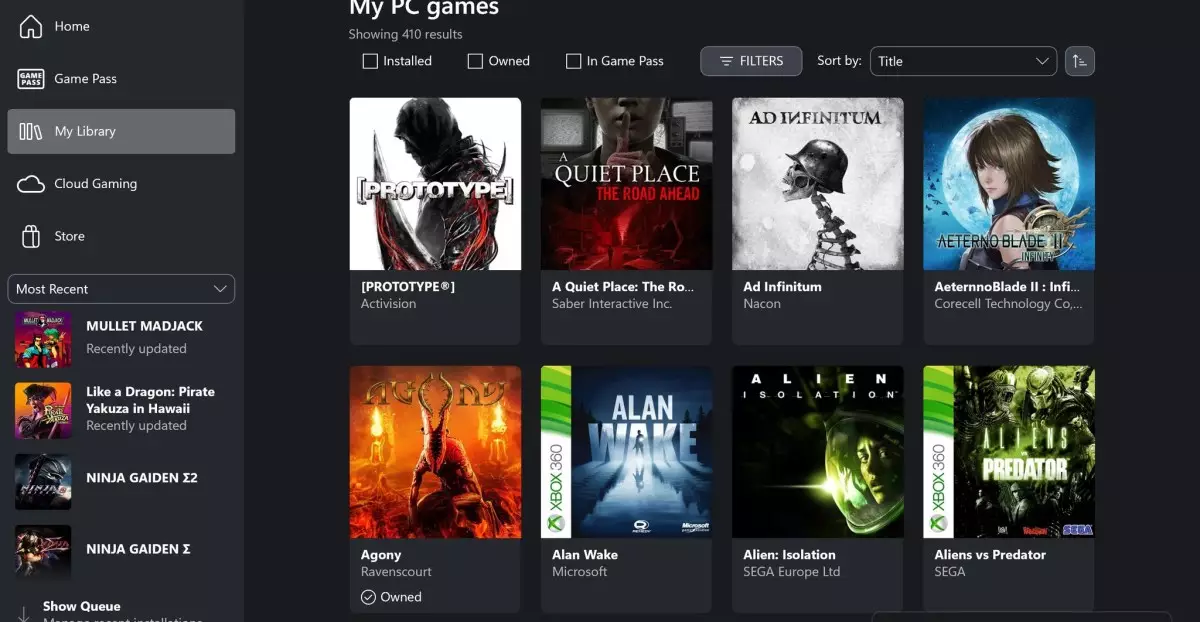For decades, the gaming industry has been characterized by an ongoing rivalry between console gamers and PC enthusiasts. However, recent developments indicate that Microsoft is on the cusp of changing this dynamic significantly. The company is taking substantial strides to integrate its Xbox and Windows platforms, creating a cohesive ecosystem that could reshape how players interact with games. The early signals of this shift have emerged from updates to the Xbox app on Windows, where console games are making their way into the PC interface, sparking both curiosity and enthusiasm among gamers.
A Closer Look at the Xbox App Evolution
The recent updates to the Xbox PC app reveal an intriguing development: games from Xbox consoles, including classics like *Alan Wake* on Xbox 360, are now being displayed within the library for users who own them. While players currently cannot install these titles through the app, their presence suggests a strategic move toward unifying Xbox and PC gaming libraries. This is not merely a technical glitch; it reflects an intentional push by Microsoft to create a singular digital marketplace that transcends the traditional boundaries separating static consoles from dynamic PC gaming.
By allowing users to see titles they already own in a more consolidated space, Microsoft is not only optimizing user experience but also fostering a sense of community and continuity among gamers. Such a seamless integration could motivate more console gamers to explore the opportunities that PC gaming has to offer, ultimately diminishing the existing chasm between the two communities.
Project Kennan: Bridging the Divide
As reported by Tom Warren, Microsoft’s ambitions extend beyond mere app updates. The company is reportedly working on Project Kennan, a handheld gaming device aimed at facilitating the merging of Xbox and Windows gaming experiences. This device could serve as a physical embodiment of Microsoft’s broader strategy—beyond just software, merging the hardware environments of PC and console into a singular experience. Given the growing competition from rivals like SteamOS, this move signifies that Microsoft recognizes the shifting landscape of gaming and is ardently trying to adapt.
Project Kennan is not just an isolated initiative; it represents a more extensive effort by Microsoft to rethink the gaming ecosystem. In a world increasingly driven by accessibility and portability, such devices may become the new norm, challenging the status quo of both console offerings and traditional PC gaming setups.
Steam and Epic Games Integration: A Game-Changing Move
Another aspect of Microsoft’s strategical pivot involves the integration of games from other platforms like Steam and the Epic Games Store into the Xbox PC app. The excitement generated by leaked mockup images depicting Steam games within the Xbox interface exemplifies this ambition. By allowing players to see every game installed on their PCs—regardless of the source—Microsoft is essentially leveling the playing field, positioning itself as a central figure in the world of digital gaming.
This move not only extends the gaming library available to users but could also lead to greater collaborations and cross-promotions across platforms. It appears that Microsoft is fostering a sense of inclusivity, providing users access to games from various ecosystems while solidifying its platform as a must-have for digital gamers.
The Future of Game Accessibility: Cloud Gaming and Beyond
Yet, the most tantalizing question remains whether this integration will lead to playable Xbox console games directly on PC. As Microsoft develops its cloud infrastructure, the potential for a breakthrough in game streaming becomes palpable. The notion of playing classic Xbox games on PC via cloud technology addresses a recurring desire among gamers and opens up exciting possibilities for future game accessibility.
Imagine a gaming landscape where nostalgia meets the latest advancements in technology, allowing users to dive into their favorite classics without the constraints of hardware limitations. If Microsoft can successfully leverage its cloud capabilities, they might not just provide a way to play old games but also set a new standard for how games are distributed and experienced across platforms.
Overall, these developments signal a transformative period in gaming. The convergence of Xbox and Windows is not merely about merging platforms; it is about reimagining how we interact with digital entertainment. As we move forward, the implications of this strategy could resonate beyond Microsoft, influencing how other companies approach the ever-evolving landscape of gaming.

